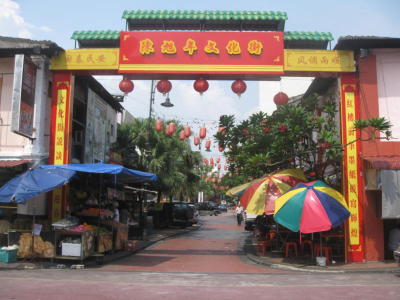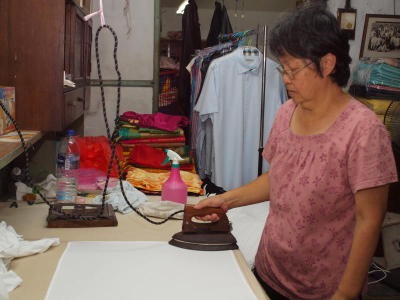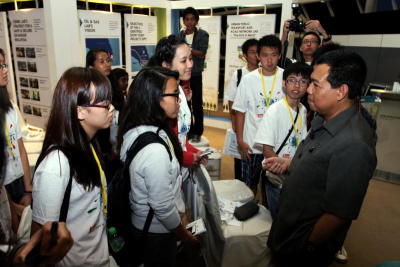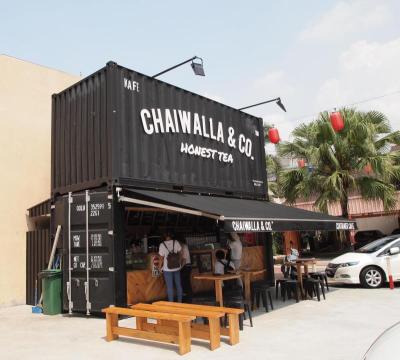
Walking back in time: The BRATs walked through the arch leading to the beginning heritage of Johor Baru.
Hidden heritage
THE BRATs took to the heritage trail around Jalan Tan Hiok Nee in Johor Baru to see what fascinating stories they could uncover. And yes, there is a heritage trail in Johor Baru now.
Long dismissed as just “the city before you reach Singapore”, or worse still, some cowboy town where gun-slingers rule, Johor Baru is now going through something of a renaissance. And a good place to experience this rebirth – by seeing how the old and new converge – is at the heritage trail.
Modern twist
SMACK in the middle of the Jalan Tan Hiok Nee heritage trail stands two shipping containers in the corner of an open air parking lot, conspicuous by their modern, minimalistic design.
At around 10am every day, these containers are transformed into Chaiwalla & Co., a trendy tea and coffee joint that provides a nice contrast to the old buildings around the area.
Childhood friends Abdul Razak Misan and Nazrul Hakim Putra, both 30, are the founders of this “container cafe”, a concept they’ve seen overseas. Earthquake-prone Christchurch, New Zealand, in particular, has plenty of container shops.
“We bought the used containers for RM6,000, and spent another RM15,000 decorating the interior,” said Nazrul. Altogether, it took RM150,000 to start-up the business.
“It was a gamble because the local council couldn’t visualise what we wanted to do. We had to build it first, and then they came, saw the containers, and decided to give us a premises license.”
It was even more of a gamble considering both Nazrul and Abdul Razak had quit their jobs for the venture. The former was the captain of an offshore oil rig supply vessel and the latter a delivery manager for Pos Malaysia – and married with two children.
The two are hoping to open a branch in the Klang Valley, but business in Jalan Tan Hiok Nee has been so good, they’re already planning to add another two containers to the site to provide “indoor seating”.
“It’s been really great running our cafe around these old shops,” said Nazrul. “Customers from the old bakeries and kopitiams drop by here, and our younger crowd goes to them too.
“There’s a lot of harmony in this area.”

he wife of the owner of the Kedai Dobi Shanghai using an old antique iron to iron laundries, who says that it is better than modern iron, despite it’s heavy weight.
The royal laundryman
CHIEW Kek Whye (above), 60, was literally born into the Shanghai Dhoby and Dry Cleaning Company on Jalan Tan Hiok Nee.
“I was born in this very shop, upstairs, where my family used to live,” said the well-spoken Chiew. “Back then, there were 11 of us all crammed up in two rooms!”
The laundry business was established back in 1942 by Chiew’s father, who was originally from Shanghai (hence the name). Chiew started helping out when he was 14, and took over in 1998.
To this day, Chiew still washes everything by hand, and he still operates a 60-year-old iron – one that’s actually made out of iron. Apparently, nothing presses better than that, though its weight makes it quite difficult to operate.
But the results speak for themselves. The unassuming “Kedai Dhoby Shanghai” (as the signboard on the shop reads) has been serving the Sultan of Johor for as long as Chiew can remember.
“Since 1942, my father and I have done laundry for four different Sultans,” said Chiew proudly. Other customers include state assemblymen and chief ministers.
Chiew isn’t worried about the more modern laundry businesses opening up at the neighbouring Jalan Dhoby either. “It’s always better when something is hand-washed. That’s why our customers keep coming back to us.”
Sadly, Chiew said Kedai Dhoby Shanghai will have to close down someday.
“Once I am too old to work, I will retire and close the shop,” said Chiew. It’s not a business he wants his children to get into. “It’s not an easy life.”
At the moment, Chiew operates the entire business just between him and his wife, Chow Geok Lian, who he also met at the shop.
The two spend most of their days working side-by-side, washing, drying and pressing laundry.
“I can’t describe how important my wife is to me,” said Chiew with a smile, and his arm lovingly wrapped around her shoulder.

BRATs JB workshop. Participants will be going to Legoland, ExxonMobil’s fabrication yard and doing a mock press conference with Iskandar CEO Datuk Ismail Ibrahim.
The new south
A STRONG and sustainable metropolis of international standing.” That’s what Iskandar Development Regional Authority (IRDA) CEO Datuk Ismail Ibrahim hopes to create in Johor Baru, Johor.
“And by sustainable, we mean building something today without compromising the future,” said Ismail, during a mock press conference with the BRATs at the Iskandar Malaysia Information Centre in Danga Bay, Johor Baru.
It’s no surprise, then, that IRDA was behind the development of the Jalan Tan Hiok Nee heritage trail in Johor Baru city. It’s not just economic sustainability Ismail is looking at. Social and environmental sustainability are just as important to him and IRDA.
“There must always be equilibrium between the three,” he said.
When asked which IRDA project he’s most proud of, he replied: “While you are with an organisation, you will never feel satisfied with your achievements. You will always want to improve. You will only feel proud after you leave.”
Ismail admitted sheepishly that he wasn’t an academic over-achiever in school.
“But I hold to the principle of opportunity,” he said. “Most of the time, opportunity will only come once. If you wait, it might take many moons, and you could be too old by then.
“So I set certain directions for myself, but if a better opportunity comes along, and the prospects are better, I would take it.”
*The BRATs young journalist programme is organised by R.AGE and supported by ExxonMobil. For more info, log on to facebook.com/starbrats.


Leave a reply